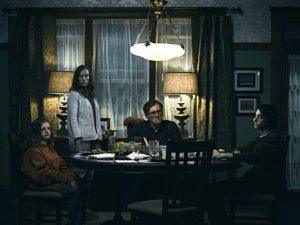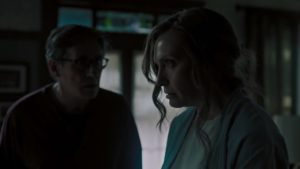The only thing wrong with HEREDITY is that is bound to spawn increasingly inferior installments in a new franchise that is as inevitable as its protagonists’ descent into madness. That aside, this deeply disturbing horror film does not need the supernatural in order to worm its way into the darkest recesses of your psyche where it will unhinge you on a primal level starting with the hypocrisy of obituaries and the creepiness of dollhouses, and ending with the stresses of modern family life as reality and madness become interchangeable. It’s a metaphor of the first order, and one that hews so close to reality that the comfortable remove of fiction blurs into nothingness.
Toni Collette stars as Annie, an artist working in miniature tableaux and coping with the death of her difficult mother. The coping stems from her lack of grief, the which makes sense as she unspools tales of woe to a grief support group. She sorts out her feelings with the group therapy, and by constructing trangressive tableaux of her mother. The death leaves husband Steve (Gabriel Byrne) and son, Peter (Alex Wolff) equally unscathed, in contrast to what happens later after another death visits the family. The only one that might be having some issues is Charlie (Milly Shapiro), who was grandma’s favorite. It’s hard to tell. Charlie is a creepy child, and not in an adorable, or even likeable way. She’s withdrawn, her oddly old face impassive even while gazing into grandma’s coffin at the funeral, or regarding the dead bird that crashed into her school window. The lack of emotional affect makes her statements about missing grandma eerie rather than heartwarming or sweet.

Milly Shapiro, Toni Collette, Gabriel Byrne, Alex Wolff
What emerges in short order is a history of mental illness in Annie’s family, a condition that Annie seems to have escaped. Or, as horror films will always ask, did she? Are the things that are happening to the family supernatural, or is there a more mundane explanation? And, as the best horror films ask, does it matter? The root of what makes the story so compelling is that jolt of familiarity as Annie, damaged by her mother’s failings as a parent, in turn wounds Peter, and possible Charlie (again, it’s hard to tell) as her unresolved issues erupt. It’s anything but supernatural. Nor is the guilt that weighs as heavily as any occult curse from beyond. Collette is a maelstrom of good intentions and utter despair as Annie struggles to ground herself, alternately lashing out and begging for forgiveness. She evokes empathy and revulsion while maintaining a vulnerability that is painful to watch as she increasingly isolates herself from the ones to whom she most wants to connect. A scene of a family dinner gone wrong has never made forks so sinister.
Writer/director Ari Aster toys with the audience about what it really happening, but he doesn’t spare it. Is the invitation to a séance that slips through the mail slot regular post, or something more sinister? That we ask is a testament to his skill in disorienting us so expertly. The turn Annie’s art takes causes Steve to question her sanity. Peter may or may not be seeing things that shouldn’t be there, as does Charlie. The pace is deliberately measured, yet anything but slow. Aster is equally deliberate in what he chooses to show us, and when, and why.

Gabriel Byrne, Toni Collette
There are tantalizing clues scattered throughout, and a fiendish foreshadowing that comes to terrifying fruition. Strategically composed scenes have an eerie elegance that is saturated with a dread of the inevitable doom, all leading up to a final 20 minutes that is as mesmerizing as a descent to madness, and as intensely terrifying. It’s the anticipation of what is to come coupled with the uncertainty of whether what we are seeing is real, from Annie’s new-found sympathetic friend (Anne Dowd) to the play of light across a wall.
HEREDITY is equally adept at quoting both Greek tragedy and gothic horror in its pursuit of royally messing with our minds as he explores the darker implications of familial legacies. And it succeeds. Splendidly.
Your Thoughts?